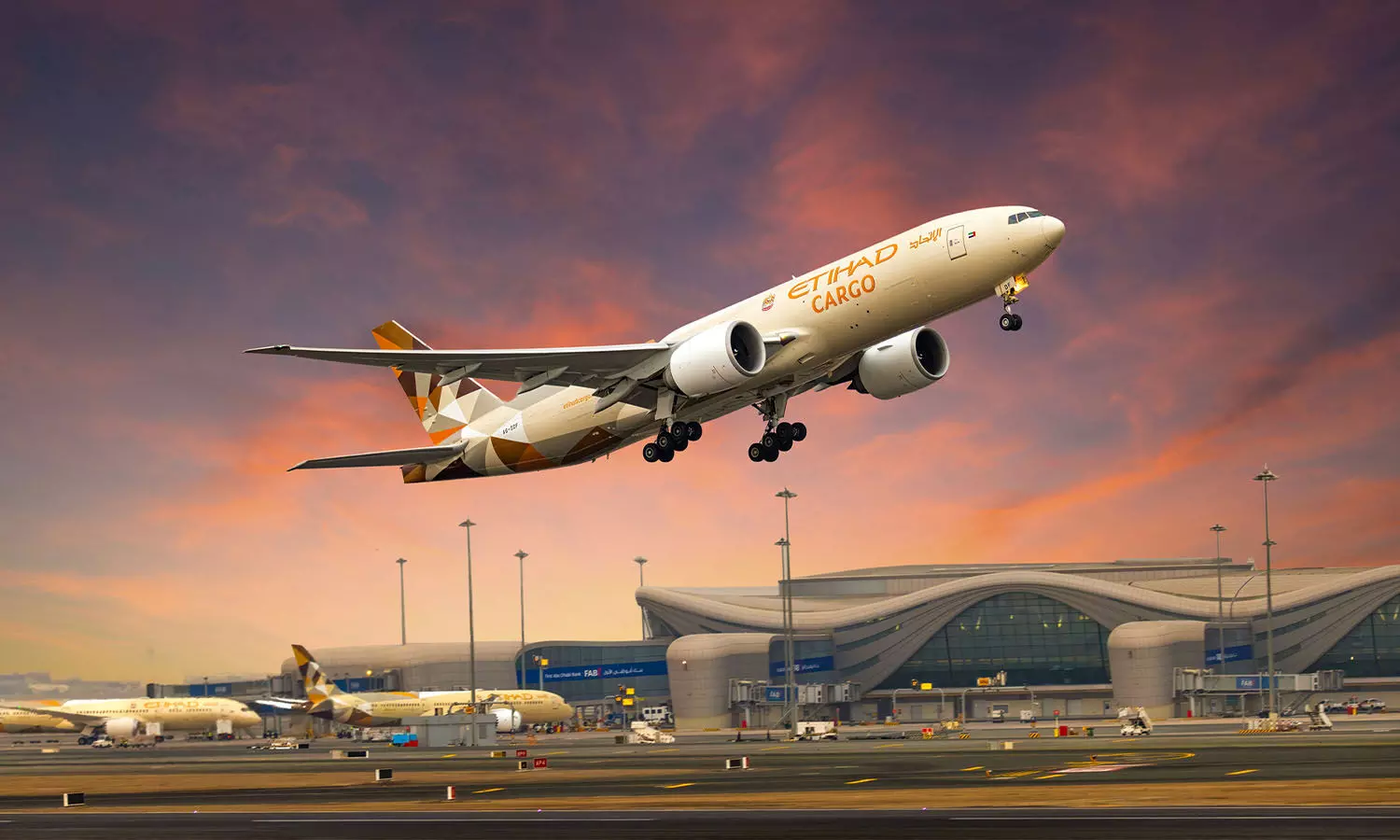
Ascent of Abu Dhabi: The making of a cargo hub
Abu Dhabi is positioning itself as an international hub for high-value, time-sensitive, and healthcare cargo, powered by efficiency, collaboration, and a shared vision to connect global trade through the Emirate.

As Abu Dhabi strengthens its position as a global logistics and trade hub, key industry players are powering its transformation. With major investments in infrastructure, technology, and multimodal integration, the emirate is shaping a logistics ecosystem that connects Asia, Africa, and Europe with speed, precision, and reliability.
Etihad Airways Cargo is playing a central role in linking the Emirate’s ambitions with tangible infrastructure, technology, and service capabilities.
According to Stanislas Brun, Chief Cargo Officer of Etihad Airways, the airline’s development is inseparable from the Emirate’s broader vision. “We are the airline of the Emirate, which means we are inspired and driven by the vision that Abu Dhabi is becoming an international hub for both passengers and cargo,” he said.
Etihad Cargo’s current focus reflects Abu Dhabi’s economic priorities, diversifying high-value logistics segments such as pharmaceuticals and food. Brun pointed to two defining initiatives. “The first is the pharma hub that we launched this year with GSK and the Department of Health,” he explained.
On 15 April 2025, the British multinational pharmaceutical and biotechnology company GSK opened its regional vaccine distribution centre in Abu Dhabi, located in the Khalifa Economic Zones Abu Dhabi (KEZAD). “It is designed as a storage and distribution centre for medicines across the region, ready for any urgent demand.”
The second major initiative revolves around food logistics. “We are processing and exporting food products to destinations like the Seychelles, Maldives, and Mauritius,” he said. “Ingredients are sourced here, processed to reduce weight and prep time at destination, and shipped to hotels ready for final preparation.”
Abu Dhabi’s expanding agricultural sector is also contributing to new export flows. “The Emirate is growing more perishables locally,” Brun noted. “This winter we expect to export more fresh produce, like tomatoes and fruits, mainly to Europe."
“We are the airline of the Emirate, which means we are inspired and driven by the vision that Abu Dhabi is becoming an international hub for both passengers and cargo.”
Stanislas Brun, Etihad Airways
While regional rivals such as Dubai, Doha, and Riyadh are investing heavily in logistics, Brun believes Abu Dhabi’s biggest advantage lies in its efficiency and available capacity. “Some other hubs in the region face congestion issues,” he said. “Abu Dhabi does not have these constraints. With our double runway and smooth coordination with customs and port authorities, we can move shipments quickly to their final destination.”
This operational agility is supported by the Emirate’s geographic advantage, positioned naturally between Asia, Africa, and Europe, and its emerging multimodal ecosystem. “We are working closely with Abu Dhabi Ports and Etihad Rail under the ADQ umbrella,” Brun said. “All the different logistics parts of the puzzle are talking and working together to make sure transfers are smooth.” A secure corridor between port and airport is among the projects currently in discussion, expected to take shape around 2026.
Etihad Cargo is also investing in advanced technology to win the confidence of shippers handling high-value goods and electronics. “We just launched SmartTrack, the first solution in the world that gives forwarders and shippers a permanent view of their shipment, including temperature, humidity, light exposure, and shock levels,” Brun said.
More than tracking, the airline is using data to anticipate and prevent risks. “We’ve developed a unique AI tool that detects potential issues before they happen. It pinpoints where risks of temperature excursions or humidity might occur and alerts our teams in advance,” he explained. “This gives high-tech and high-value customers real peace of mind.”
Abu Dhabi’s cargo ambitions are being reinforced by major infrastructure and fleet investments. The new East Midfield Cargo Terminal (EMCT), expected to open before 2027, will redefine Etihad’s handling capacity. “It will be a state-of-the-art, 90,000-square-meter terminal with full temperature control and dedicated zones for perishables, pharmaceuticals, secure, and dangerous goods,” Brun said.
Fleet expansion is also on the agenda. “We now operate six freighters in addition to our widebody passenger aircraft,” Brun noted. “We’ve just launched a new freighter route to East Midlands Airport in the UK, and we have ten A350 freighters on order for delivery starting in 2029, which will allow us to double our freighter capacity by the early 2030s.”
“Positioning Abu Dhabi as a hub for healthcare products would enhance cooperation between the Emirates within the UAE and create new corridors for pharmaceutical products.”
Leon Diradourian, Kuehne+Nagel
As Etihad Cargo anchors the airside of Abu Dhabi’s logistics ambitions, global freight forwarders are equally vital in transforming the emirate into a fully integrated supply chain hub. Among them, Kuehne+Nagel stands out for aligning its healthcare and humanitarian logistics strengths with Abu Dhabi’s growing infrastructure and policy support.
Kuehne+Nagel views Abu Dhabi’s growing logistics ecosystem as a natural fit for its global capabilities in healthcare and humanitarian logistics. According to Leon Diradourian, GCC+ Cluster Managing Director, Kuehne+Nagel, the convergence of the emirate’s infrastructure, policy support, and location with the company’s specialised expertise is creating a powerful partnership.
“I believe we could be looking at the perfect synergy between Kuehne+Nagel’s global expertise and local experience, and Abu Dhabi’s world-class infrastructure, strong government support, and strategic geographical location,” Diradourian said.
He emphasised that positioning Abu Dhabi as a healthcare and pharmaceutical logistics hub would not only strengthen inter-emirate cooperation but also open new trade corridors for the movement of critical medical products.
“Positioning Abu Dhabi as a hub of healthcare products would boost the cooperation between the Emirates within the UAE, and create new corridors for pharmaceutical products,” he added.
Kuehne+Nagel has invested in on-ground capabilities to support this vision. The company maintains a dedicated team of logistics experts based in Abu Dhabi, ensuring tailored support for customers handling sensitive and high-value shipments.
“We have a team of experts permanently based in Abu Dhabi, ready to support our customers,” Diradourian noted.
In addition, Kuehne+Nagel operates from the International Humanitarian City (IHC), a vital regional base for humanitarian relief and emergency response, located just 40 minutes from Zayed International Airport.
“Over the next five years, we expect Abu Dhabi’s role to grow significantly as it becomes a preferred gateway for high-value, time-sensitive, and e-commerce cargo.”
Darren Baker, KLN Logistics Group
While Kuehne+Nagel strengthens the healthcare and humanitarian side of the ecosystem, KLN Logistics Group is translating Abu Dhabi’s multimodal potential into operational reality. Its growing presence at the Abu Dhabi International Airport and within Khalifa Economic Zones reflects how private logistics players are expanding in step with the emirate’s vision.
According to Darren Baker, COO – EMEA Region, KLN Logistics Group, the emirate’s progress is anchored in the expansion of Abu Dhabi International Airport (AUH) and KIZAD, which together create “one of the most integrated multimodal ecosystems in the Middle East.”
He notes that Abu Dhabi’s air, sea, and land connectivity, enhanced by world-class infrastructure and digital systems, is setting new standards for regional logistics. “Over the next five years, we expect Abu Dhabi’s role to grow significantly as it becomes a preferred gateway for high-value, time-sensitive, and e-commerce cargo,” says Baker. The emirate’s government-led initiatives in smart logistics, capacity expansion, and industrial diversification are expected to further strengthen its competitiveness and global appeal.
At the operational level, KLN’s Abu Dhabi Gateway exemplifies how private players are aligning with this national logistics vision. Baker explains that the facility offers “a fully integrated, airside-controlled operation that bridges air, sea, and land seamlessly.” With direct access to the airside at AUH, on-site customs clearance, X-ray screening, and 24/7 operations, the Gateway is designed to optimise speed, control, and visibility for both B2B and B2C cargo movements. This setup enables faster turnaround and end-to-end transparency, features that are increasingly critical in e-commerce, express delivery, and perishables logistics.
KLN’s growing portfolio in Abu Dhabi reflects the emirate’s shifting cargo mix. “Our key growth drivers include e-commerce, express shipments, high-value cargo, perishables, and time-sensitive products,” Baker notes, highlighting how these verticals demand reliability, speed, and security. The company manages this through “a fully integrated control system that connects our warehouse, customs, and delivery platforms,” ensuring minimal dwell time from aircraft arrival to final delivery.
Looking ahead, KLN is scaling up its operations to match Abu Dhabi’s long-term logistics ambitions.
“We’re investing in the expansion of our Abu Dhabi Gateway to further enhance airfreight and multimodal logistics services,” Baker confirms. Plans include developing the AUH Gateway into a regional consolidation and distribution hub, strengthening cross-border trucking networks to Saudi Arabia and the wider GCC, and enhancing capabilities for sectors such as electronics, fashion, industrial products, perishables, and e-commerce fulfilment.
With a shared focus on efficiency, innovation, and seamless connectivity, Abu Dhabi is turning its logistics ambitions into tangible results. From advanced cargo tracking and multimodal integration to specialised hubs for pharmaceuticals, perishables, and high-value goods, the emirate is emerging as a preferred gateway for global trade, one where speed, reliability, and collaboration set the standard.
The article was originally published in the Nov 2025 issue of The STAT Trade Times.

